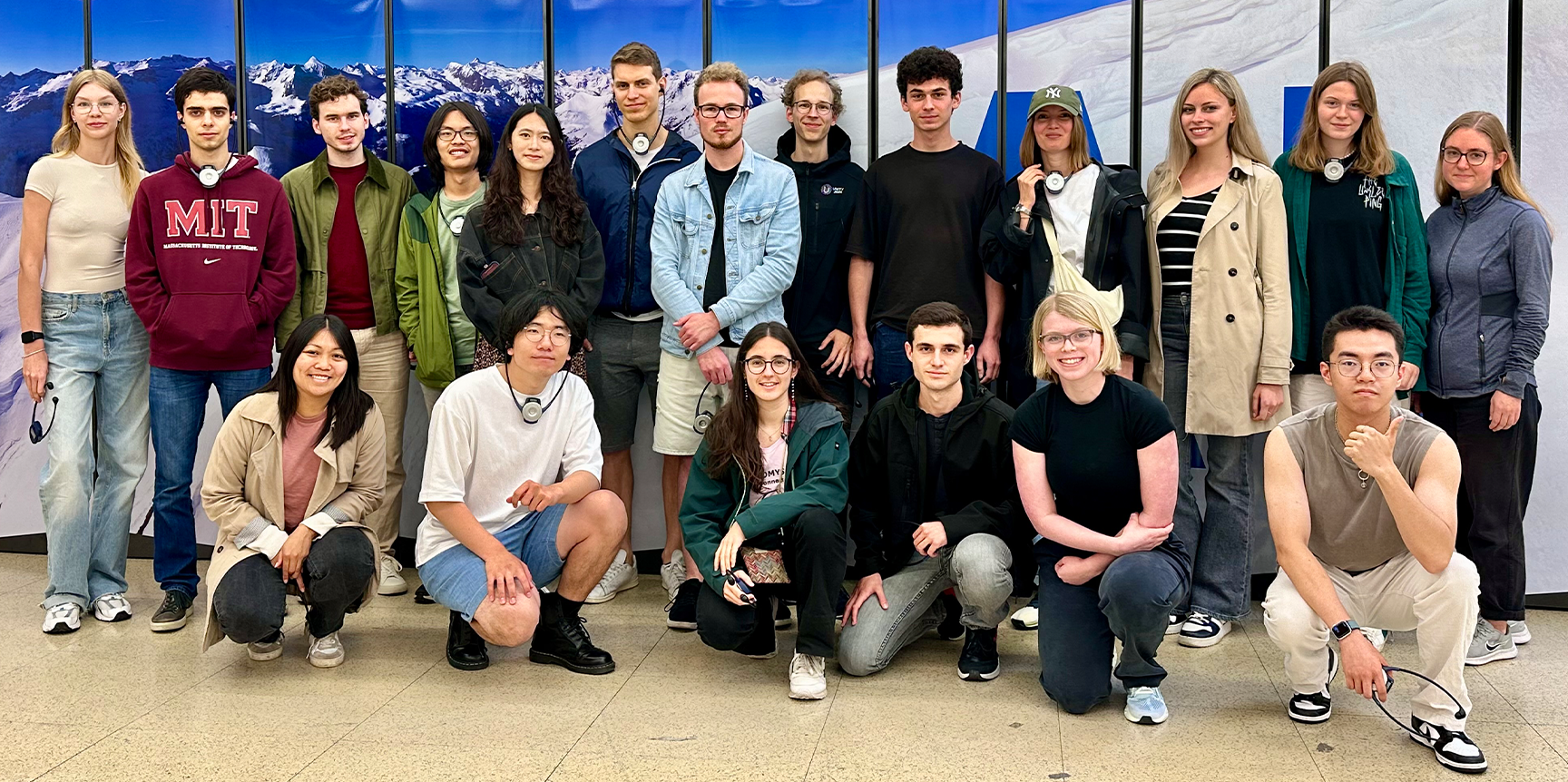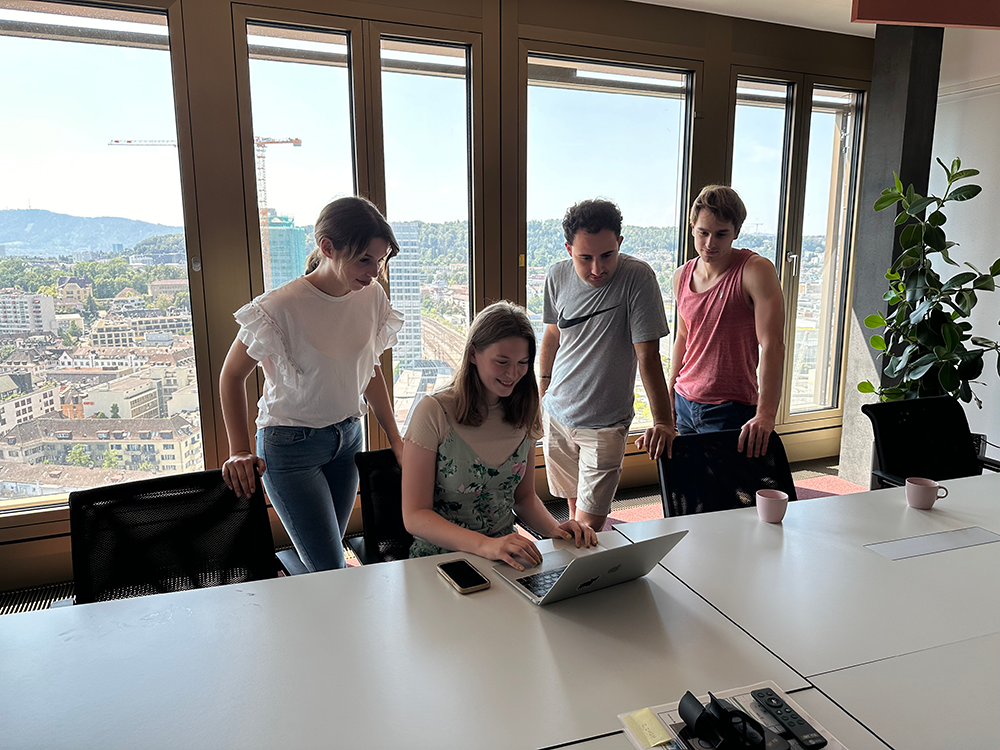A fellowship full of special insights
The Summer School Research Fellowship programme offers students from around the world the opportunity to gain their first research experience in various areas of computer science. Four students describe their research experiences and personal highlights.

Gain hands-on experience in research and connect with like-minded people: each year the Summer Research Fellowship (ETH SSRF) programme offers undergraduate and graduate students around the world the chance to gain their first experience in the field of research. The fellowship offered by the Computer Science Department lasts two months and takes place during the summer. From July to August, the chosen applicants are able to pursue a research project that aligns with their interests, as part of a research group within the department. This includes daily collaboration and interaction with other group members.
But the visiting students are also able to get in touch with the other fellows. They visit interesting places around Zurich and Switzerland, like the CSCS in Lugano or the Lindt Home of Chocolate, and get to experience the beautiful Swiss landscape on hiking trips.
Between city trips and natural language processing
This year’s programme includes 20 students from all around the world. One of them is Sasha Mikushova. She’s from Ukraine and is currently doing her Bachelor’s degree in Computer Mathematics at the Taras Shevchenko National University of Kyiv. “It’s like a mix of mathematics and programming,” Sasha says.
She heard about the SSRF programme from a friend that is presently studying at TU Wien. “She told me about the programme, and I’m very grateful to her for bringing the fellowship to my attention,” she says.

During her two-month long fellowship Sasha is working in the research field of natural language processing. She’s currently contributing to a data set by the name of “MathDial”, which was created by developers from ETH Zurich in cooperation with their colleagues from institutions worldwide. “It consists of various dialogues between a teacher and their students. The students need to solve a maths problem in that context,” Sasha explains. “To evaluate how well the teacher performs, I’m generating a data set with classified teacher utterances. Later I will train a model which will be able to evaluate teacher's utterances on its own,” Sasha specifies.
“I'm really grateful that a friend of mine brought this fellowship to my attention!”Sasha Mikushova
Apart from the daily research, she also very much enjoyed the different activities that the fellows were able to pursue. “I really enjoyed going on a tour around Zurich and the old part of the town,” she says. She enjoyed it so much, in fact, that she recreated the tour with some other friends of hers afterwards.
How to jailbreak an LLM
Sun Luze, originally from Shanghai, is also very pleased with the different activities that the fellowship offers. “I really liked our hiking trips,” he says enthusiastically. Sun is currently pursuing his Master’s degree in System Engineering at the University of Pennsylvania in the United States. Prior to that, he did his Bachelor’s in the UK, namely at the University of Bristol. Now he spends two months doing research in Zurich. “I already knew ETH Zurich well, because a few of my friends studied here and I knew about its very good academic reputation in computer science,” Sun says. He didn’t have that much research experience before, which is why he wanted to pursue a research project with a professor. “I wanted to see what I’m capable of doing,” he says.

Sun gains his first research experience in the field of information and system security. “I was involved in creating a benchmark for a large language model. We want to test the model utility after a jailbreak happens,” he explains. Usually, if a Large Language Model like ChatGPT gets asked a particularly thorny question (for example: “How do I build a bomb?”), the LLM won’t give an answer due to security and privacy concerns. “But with a jailbreak, you can enable the LLM to produce toxic or harmful content,” Sun says.
“I wanted to see what I'm capable of doing.”Sun Luze
His research group is jailbreaking a fine-tuned LLM and they want to find out if its accuracy to answer a question can be restored to a pre-fine-tuned model. “We have to do a lot of experiments, to see whether the accuracy of the LLM after one method of jailbreaking goes up or goes down,” he says. Sun enjoyed the atmosphere inside his research group very much. So much so, in fact, that he’s thinking about applying for a doctoral position at ETH next year. “The fellowship brought me very interesting experiences and definitely broadened my horizon.”
Experience the inner workings of a research group
Josef Schönberger from Munich is also very much enjoying gaining so many new experiences. “It’s very interesting to come into contact with the inner workings of a research group,” he says. “My supervisors are very friendly and they let me pursue my own ideas. I cherish that a lot!” Josef is currently doing his Master’s degree in Computer Science at the Technische Universität München. Some friends of his were telling him about the SSRF programme because they saw it in their own university’s newsletter. “I’ve thought about going to ETH Zurich for a while anyway. It’s a highly regarded university and it is doing research in my fields of interest,” Josef says.

During his fellowship Josef is working in the Systems Group, specifically in the area of cloud engineering. His research team is currently developing a platform for cloud software, specifically function-as-a-service. “The platform specifies a distinct structure for a client's software, which allows the software to consistently process customer requests in a quick way. Ultimately, this results in a guaranteed responsive end user experience, regardless of the current server workload”, he says.
“My supervisors are very friendly and let me pursue my own ideas.”Josef Schönberger
It is his job to compare the platform with some similar software developed by Google. “I’m specifically interested in the performance aspects. But security will also play a significant role in the coming weeks,” Josef elaborates.
An algorithm to better understand cancer
Teodora Kovacevic is also cherishing her research visit at ETH Zurich immensely. After living in Germany and Bosnia, she moved to Rome to pursue her Bachelor’s degree in Bioinformatics. “But I was already following ETH Zurich for a long time anyway. And then I saw the posting for the fellowship, and I fell in love with the collection of labs that are involved in the programme. I immediately decided to explore this research opportunity,” she says.

At ETH Zurich, Teodora is working in the field of biomedical informatics. “I always loved the intersection between computer science and biology,” she explains. During her fellowship, her group is trying to build an algorithm that can simulate the development of cancer cells. “It’s very hard to get the data from cancer cells, because they’re mutating and dividing in such a fast way,” she says.
“When I saw the collection of labs, I immediately decided to pursue this research opportunity.”Teodora Kovacevic
That’s why she and her team wanted to simulate the biological processes that happen in actual organisms and implement that information in a computer. “That way a computer can understand what’s actually happening in cells and implement those processes on the data that we’re given,” Teodora says. For her, working at ETH Zurich was exactly like she always imagined it. “Honestly, being here and doing this kind of research – dreams do actually come true,” she says.